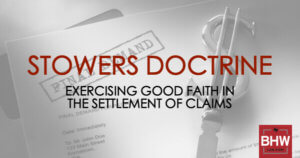What is the Stowers Doctrine and How Does it Apply to a Personal Injury Case in Texas?
 Under the typical Texas liability insurance policy both the insurer and the insured have mutual obligations and rights. The insured pays a premium to their insurance company to protect against unexpected losses and claims. On the other hand, the insurance company has a duty to defend against claims covered under the policy and a right to control the defense of litigation should it arise.1 Included in the right to control litigation is the insurer’s authority to make the decisions concerning policy coverage, the merits of claims made by third parties against the insurance company, and the settlement of such claims.2 But what happens when an insurance company refuses an offer to settle within the policy limits?
Under the typical Texas liability insurance policy both the insurer and the insured have mutual obligations and rights. The insured pays a premium to their insurance company to protect against unexpected losses and claims. On the other hand, the insurance company has a duty to defend against claims covered under the policy and a right to control the defense of litigation should it arise.1 Included in the right to control litigation is the insurer’s authority to make the decisions concerning policy coverage, the merits of claims made by third parties against the insurance company, and the settlement of such claims.2 But what happens when an insurance company refuses an offer to settle within the policy limits?
According to the Stowers Doctrine, the insurer has an implied duty to act in good faith and accept reasonable settlement demands within policy limits.3 This is called the Stowers duty. Through this duty the insurer protects the insured against judgements in excess of policy limits. Under the Stowers Doctrine, if an insurance company negligently failed to accept a reasonable offer within policy limits and a jury then returns a verdict in excess of the policy limits, the insurance company may be liable for the entire verdict, even though it exceeds policy limits.4
History of the Stowers Doctrine
The Stowers Doctrine originated in 1929 from the Texas Supreme Court case G.A. Stowers Furniture Co. v. American Indemnity, Co., 15 S.W.2d 544 (Tex.). Stowers Furniture Co. had an auto insurance policy with American Indemnity for $5,000. During the policy term, a furniture employee’s truck was involved in an accident and suit was brought by the injured passenger, claiming $20,000 in damages. While the suit was pending, the injured party served Stowers with a letter offering to settle for $4,000—within policy limits. The letter gave a deadline to accept the offer and provided proof of the excessive damages. American Indemnity refused to settle and went to trial with the intention of saving money. They lost at trial and a jury awarded the injured party more than twice the amount of the policy. The terms of the insurance policy stated that Stowers was responsible for a judgment in excess of the policy limits. Stowers paid the judgement and then sued the insurance company for reimbursement.
The Texas Supreme Court held that American Indemnity owed a duty to Stowers to exercise ordinary care in the settlement of claims. American Indemnity was responsible for protecting the insured up to the policy limit. The Court remanded the case to the district court to allow testimony of the serious nature of the passenger’s injuries to determine if American Indemnity was negligent in refusing the settlement offer.5 If American Indemnity rejected a reasonable settlement within the policy limits, they would potentially be liable for the entire judgement, even that in excess of the policy.6
The purpose behind Stowers is to encourage insurance companies to settle claims for the policy limit. Because insurance companies have complete power over litigation, they have a corresponding duty to their insured to exercise the same degree of care that a prudent person would exercise under similar circumstances. Failing to exercise such care is deemed negligent on the part of the insurance company.7 Put simply, the insured is protected from the insurance company taking a risk when a reasonable person would have settled.
How Does a Stowers Demand Work?
The Stowers Doctrine is a tool unique to Texas law and has created a new type of settlement demand: the Stowers demand. This demand is a time-sensitive letter sent to a third-party insurance carrier with an offer to settle within the insured’s policy limits.8 For a Stowers demand to be valid, five requirements must be met:
- the claim against the insured is within the scope of coverage;
- liability is reasonably clear;
- the demand is within the limits of the policy;
- the settlement terms are such that an ordinarily prudent insurer would accept it when considering the likelihood and degree of the insured’s potential exposure to an excess judgment; and
- the demand offers the insurer an unconditional, full release for liability.9
If these requirements are met and the insurer fails to accept the offer by the deadline, the defendant’s insurance company may be held responsible for verdict in excess of its insured’s policy limits.10
Footnotes:
- Stephen G. Cochran, Texas Practice Series: Consumer Rights and Remedies § 5.13 (3d ed. 2017).
- Id.
- American Physicians Ins. Exch. v. Garcia, 876 S.W.2d 842, 846 (Tex. 1994).
- See G.A. Stowers Furniture Co. v. American Indemnity, Co., 15 S.W.2d 544, 547 (Tex. 1929).
- Id. at 548
- Id. at 547
- Texas Farmers Ins. v. Soriano, 881 S.W.2d 312, 314 (Tex. 1994).
- American Physicians Ins. Exch. v. Garcia, 876 S.W.2d 842, 844–45 (Tex. 1994).
- Id. at 849; Trinity Universal Ins. Co. v. Bleeker, 966 S.W.2d 489 (Tex. 1998).
- See Ecotech Int’l, Inc. v. Griggs & Harrison, 928 S.W.2d 644, 646 (Tex. App.—San Antonio 1996, writ denied); Stowers Doctrine, Int’l Risk Mgmt. Inst.










